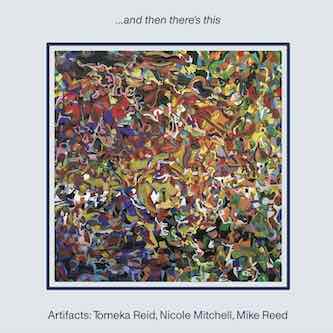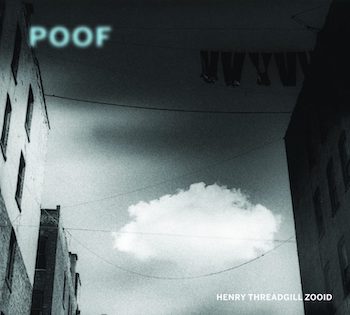Jazz Albums Review: Innovation Through Singular Combinations
By Steve Feeney
Two new Chicago-connected releases explore combinations of flute, cello, percussion, and more to good effect.
Artifacts Trio: Nicole Mitchell, Tomeka Reid, Mike Reed, …and then there’s this (Astral Spirits)
Henry Threadgill Zooid, Poof (Pi Recordings)
 The Artifacts Trio made a strong impression on the innovative jazz scene with its prior release, which explored the musicians’ Chicago jazz roots. They are also recognized as the most prominent performer-educators in the third generation of the Association for the Advancement of Creative Music (AACM), the venerable forward-looking Chicago arts organization. The group is now back with …and then there’s this, a disc that continues to honor musical forebears while adding some original material and approaches.
The Artifacts Trio made a strong impression on the innovative jazz scene with its prior release, which explored the musicians’ Chicago jazz roots. They are also recognized as the most prominent performer-educators in the third generation of the Association for the Advancement of Creative Music (AACM), the venerable forward-looking Chicago arts organization. The group is now back with …and then there’s this, a disc that continues to honor musical forebears while adding some original material and approaches.
Members Nicole Mitchell (flute, electronics), Tomeka Reid (cello), and Mike Reed (drums) have established themselves as important contemporary voices: their flexible music-making spans genres and continents while keeping preternaturally open to improvisational opportunities.
The fluttery grace of a flute is continually evident, so everything sounds a little like it’s being performed from the tops of trees. But tunes such as Reid’s “In Response To” go in an earthier, more textured direction (reminiscent of the work by Roland Kirk). A bit of electronic swirl leads into a percussive flourish from Reed that ends the piece almost too soon.
“No Side Effects” is a Roscoe Mitchell tune, and it sets Nicole Mitchell and Reid at the high and low edges of a determined march. “Song for Helena,” another Reid composition, sounds very chamber-ish before Reed comes in with brushes and provides a warm welcome for a reflective Mitchell take on a sweet melody. The result is lovely.
Mitchell’s “Blessed” wanders around a central motif and almost steps out of its own momentum before it hits a repeated riff that drives hard to the finish. Artifacts makes the kind of elevated music that sets ups impressive levels of interplay. These three like-minded musicians create experiences that reward repeated (and intent) listening.
An old cheerleading chant went something like: “Let’s have another one, just like the other one, right now!” Memories of that rah-rah sentiment ran through my mind as I listened to Chicago-born Henry Threadgill’s new Zooid release, Poof.
Composer/bandleader/saxophonist/flutist and NEA Jazz Master Threadgill, now 77, has been turning out distinctive (though similar sounding) albums for a long time now. It would be a challenge to take a “blindfold test” and misidentify one of Threadgill’s “serial intervallic” pieces. I would be hard pressed, though, to identify which album a particular track came from. Does that mean Threadgill’s releases are interchangeable? Just asking.
 The Zooid quintet for Poof features, in addition to the leader, Liberty Ellman (guitar), Jose Davila (tuba, trombone), Christopher Hoffman (cello), and Elliot Humberto Kavee (drums). All five compositions, which Threadgill refers to as “Sonatas or Concerti,” are by him and they chug along nicely with occasional breakout solos by the various musicians.
The Zooid quintet for Poof features, in addition to the leader, Liberty Ellman (guitar), Jose Davila (tuba, trombone), Christopher Hoffman (cello), and Elliot Humberto Kavee (drums). All five compositions, which Threadgill refers to as “Sonatas or Concerti,” are by him and they chug along nicely with occasional breakout solos by the various musicians.
Few “jazz” groups have ever gotten as much variety out of a sound grounded in a cello and a tuba. Add guitar to the mix, as on “Come and Go,” and you’ve got a sort of expansive angular groove that comes off as both old school and otherworldly. Suggestions of harmony are fleeting, what with the leader exclaiming and stretching out through it all. Regarding other players on the disc, Hoffman can be depended on to tell an interesting musical story — urgent, yet lyrical.
The title piece revolves around a mournful theme: Ellman contributes a subtle acoustic solo intro that sets up a plaintive Threadgill rejoinder. Hoffman tops it all off via his remarkably emotive suggestion that “Poof” refers to all kinds of things (including life) that are too quickly gone.
“Beneath the Bottom” features Davila’s trombone, antic until the leader adds some ethereal flute. That triggers a journey into a mysterious netherworld generated by arco cello and rolling drums. A harder rhythm brings the piece back into more familiar Threadgill-land for a gently percolating close.
The leader’s bass flute sets the tone for another Ellman interlude. A flute/cello flight clears the way for a percussive adventure guided by Kavee. He builds unhurriedly until his full kit is involved: frankly, the drummer might have deserved a little more time here to explore his ideas fully. But the group’s the thing for Zooid.
“Now and Then” closes the disc in typical Threadgill fashion; we are taken on a jaunty march through some prickly terrain. That’s what they do, this group — they continually survey the same ground. I have to confess, despite any quibbles, I’m glad they are mapping that territory.
Steve Feeney is a Maine native and attended schools in Maine, New Hampshire, and Massachusetts. He has a Master of Arts Degree in American and New England Studies from the University of Southern Maine. He began reviewing music on a freelance basis for the Portland Press Herald/Maine Sunday Telegram in 1995. He was later asked to also review theater and dance. Recently, he has added BroadwayWorld.com as an outlet and is pleased to now contribute to Arts Fuse.
Tagged: Artifacts Trio, Astral Spirits Records, Henry Threadgill Zooid
